Do you feel less strong when playing with your grandchildren or trying to pick up heavier items?
Studies show that muscle mass and strength begin to decline in the 4th decade (i.e. 30 - 40 years) and escalates even more after age 70. Getting enough protein from our food is crucial for preventing muscle loss and and because our bodies use protein less effectively as we get older, we need to take in more.
Few people know about the importance of protein in our diet. Not eating enough protein can have negative consequences for your health, your immune system and your level of functioning. For example, it can lead to a loss of muscle mass, an increased risk of falling or loss of the ability to carry out activities of daily living.
This is why a protein-balanced diet in addition to regular exercise can maintain keep a healthy lifestyle at any age!
How much protein per day?
European Society for Parenteral and Enteral Nutrition (ESPEN) recommends 1.0-1.2 grams of protein per kg bodyweight for all older adults, and up to 1.5g or even 2g in some medical situations. So if you weigh 70 kg, you need to eat at least 70 grams of of protein per day It is also suggested that you should try to eat at least one meal per day that provides 30g of protein.
Not sure how to reach this amount of protein per meal? Here are some examples*:
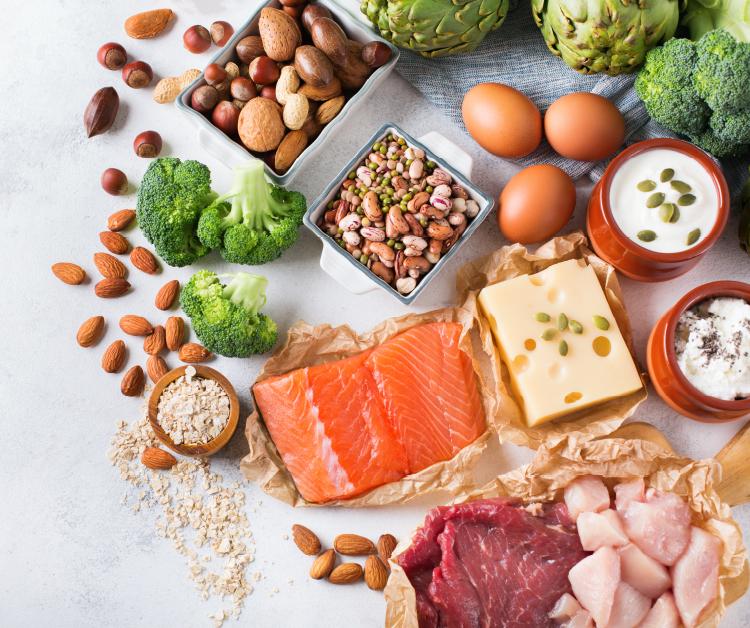
- 85 g of tuna, salmon, haddock or trout
21 g of protein
- 85 g of cooked chicken or turkey
19 g of protein
- 170 g of plain greek yoghurt
17 g of protein
- ½ cup cooked beans
8 g of protein
- 1 egg
6 g of protein
High protein drinks and snacks can be particularly useful in getting more protein.
Proteins need to work as a team with other nutrients to provide you the health benefits and functions to support both your muscle and bone health.
These nutrients include Vitamin D & Calcium.
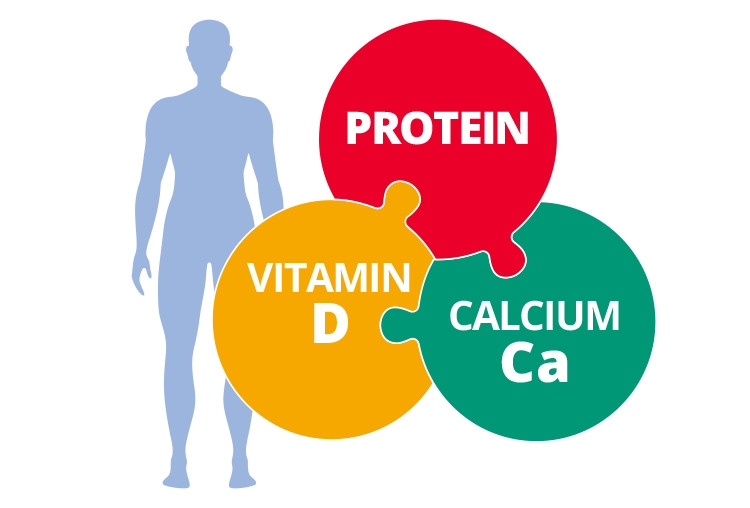
Vitamin D & Calcium: The effective combination
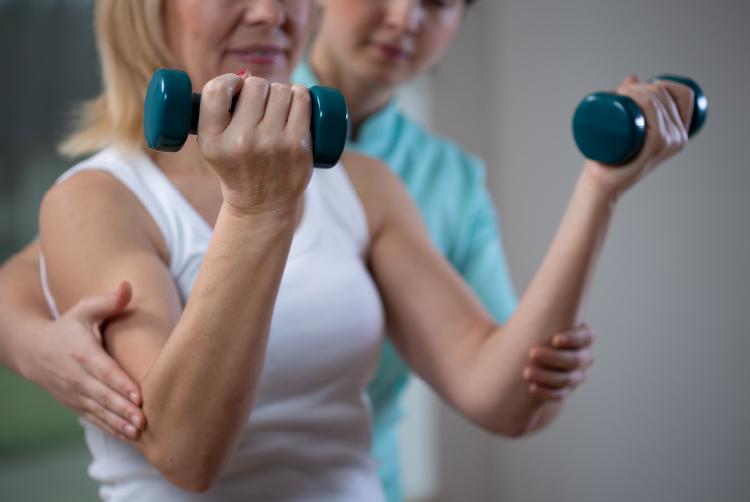
After the age of 50, our bone density also decreases. Vitamin D and Calcium play a crucial role in supporting the health of our muscle & bone system (musculoskeletal system).
Calcium works in harmony with both protein and Vitamin D to help maintain bone health. The risk of deficiency is increased as we age. Much of our Vitamin D can be produced in our skin when it is exposed to daylight. As we get older, we tend not to be outside as often and it may not be possible to achieve the daily requirement for Vitamin D from this method alone. Here, dietary Vitamin D is important.
Taking enough Vitamin D and Calcium in addition to proteins and exercise is crucial to improve your musculoskeletal health. High protein drinks enriched with Vitamin D and Calcium can be useful in getting enough of the nutrients you need.
A daily recommended dose of 1000mg calcium and 20 μg vitamin D is an effective combination to help prevent an increased risk of falls, fractures and bone loss as we get older.**
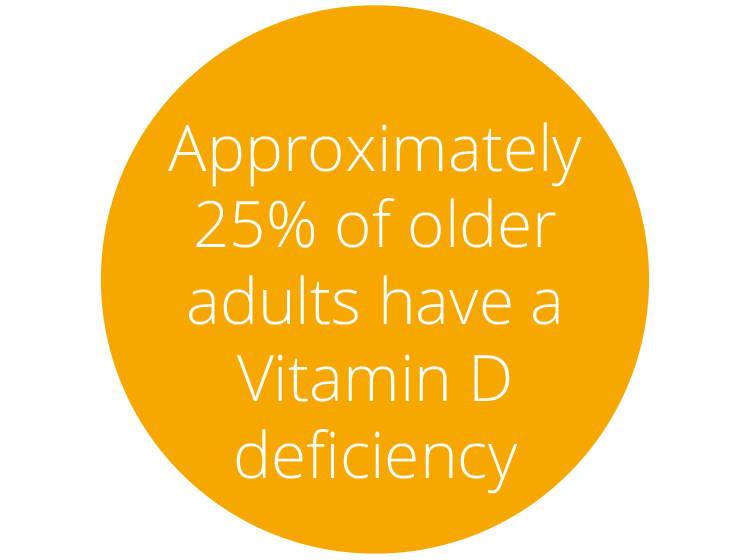
Balancing the right source & type of proteins Not only the amount of protein we take is important, but also the quality and type. We need a good balance of different protein resources that act differently to ensure optimal protein function.
During digestion all proteins are broken down into amino acids so that the body can absorb and utilise them for important functions such as maintaining muscle mass. Different types of protein do this at different rates.
So for example whey or soy proteins are broken down and absorbed quickly, usually within about 2 hours after eating - these are know as 'fast' proteins - this means the body can start to use this protein a short time after eating, but it also means they are 'used up' more quickly.
Other proteins, for example casein, take longer to be broken down and absorbed. Therefore it is usually about 4 hours after eating that they are available to be used by the body - these are known as 'slow' proteins.
By using a combination of fast and slow proteins, the time span where protein, as amino acids, is available for use by the body starts early and finishes later, often just in time for the next meal to start the process again.
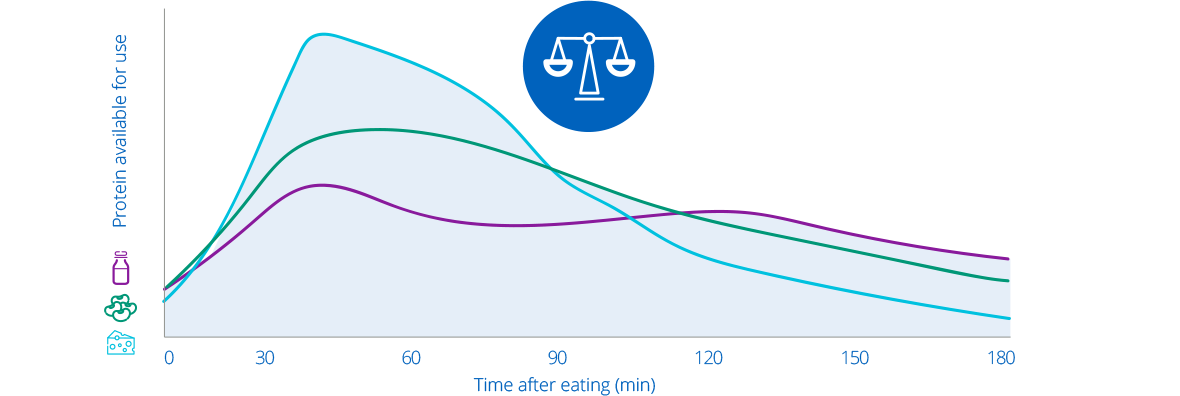
Proteins such as whey and soy are digested rapidly, which delivers a peaked yet short-term effect.
Casein (protein from milk), on the other hand, balances this action by delivering a slower, sustained effect.

You can maintain
an active and independent
lifestyle at any age through
a healthy diet & exercise!
Try out the various exercises specially designed for you!
In order to ensure getting enough of all the nutrients you need in your daily diet for a healthy lifestyle at any age, talk to your Health Care Professional about starting your nutritional journey today with Fresubin.
You can easily add variety to your diet: Fresubin products have many different flavours to choose from!
Oral nutritonal supplements have to be used under medical supervision.


